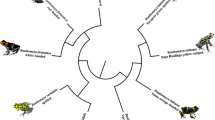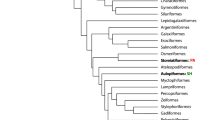Abstract
Filial cannibalism is widespread in a variety of animal species and has been generally accepted as an adaptive behavior. Within a population, some individuals adopt filial cannibalism and others do not, in spite of its adaptiveness. There is little knowledge of how such a polymorphic trait is maintained in nature. To understand the underlying mechanism of cannibalistic polymorphism, we conducted a long-term field study that involved monitoring of the reproductive experience of marked individuals in the paternal mouthbrooding cardinalfish, Apogon doederleini, in which parental males sometimes cannibalize their entire broods. We assumed that filial cannibalism can be described as one of three possible strategies: alternative, mixed or conditional. Individual cannibalistic tendencies, represented by the number of entire brood cannibalism performed by each individual in one breeding season, showed a random distribution within the study population. Moreover, the individual cannibalistic tendencies were not consistent between two successive seasons. These results suggest that filial cannibalism is phenotypically plastic, thus eliminating the alternative strategy as a possible mechanism. Comparison of variance in reproductive success between cannibals and non-cannibals showed that observations were not in accordance with those expected in the case that males adopt filial cannibalism stochastically, that is, as a mixed strategy. Our previous studies have indicated that filial cannibalism is affected by male status, such as age, somatic condition and mate availability. In conclusion, filial cannibalism by male A. doederleini is carried out as a conditional strategy.
Similar content being viewed by others
References
Austad SN (1984) A classification of alternative reproductive behaviors and methods for field-testing ESS models. Am Zool 24:309–319
Belles-Isles JC, FitzGerald GJ (1991) Filial cannibalism in sticklebacks: a reproductive management strategy? Ethol Ecol Evol 3:49–62
Cook DF (1990) Differences in courtship, mating and postcopulatory behaviour between male morphs of the dung beetle Onthophagus binodis Thunberg (Coleoptera: Scarabaeidae). Anim Behav 40:428–436
Elgar MA, Crespi BJ (1992) Cannibalism: ecology and evolution among diverse taxa. Oxford University Press, New York
FitzGerald GJ (1992) Filial cannibalism in fishes: why do parents eat their offspring? Tree 7:7–10
FitzGerald GJ, Whoriskey FG (1992) Empirical studies of cannibalism in fish. In: Elgar MA, Crespi BJ (eds) Cannibalism: ecology and evolution among diverse taxa. Oxford University Press, New York, pp 238–255
Gross MR (1991) Evolution of alternative reproductive strategies: frequency-dependent sexual selection in male bluegill sunfish. Phil Trans R Soc Lond B 332:59–66
Gross MR (1996) Alternative reproductive strategies and tactics: diversity within sexes. Tree 11: 92–98
Hausfater G., Hrdy SB (1984) Infanticide: comparative and evolutionary perspectives. Aldine, New York
Kondoh M, Okuda N (2002) Mate availability influences filial cannibalism in fish with paternal care. Anim Behav 63:227–233
Kvarnemo C (1998). Why male cannibalism won’t cause a female-biased OSR—a comment on Smith and Wootton’s paper. Rev Fish Biol Fish 8:93–98
Kvarnemo C, Svensson O, Forsgren E (1998) Parental behaviour in relation to food availability in the common goby. Anim Behav 56:1285–1290
Lank DB, Smith CM, Hanotte O, Burke T, Cooke F (1995) Genetic polymorphism for alternative mating behaviour in lekking male ruff Philomachus pugnax. Nature 378:59–62
Lima NRW, Vrijenhoek RC (1996) Avoidance of filial cannibalism by sexual and clonal forms of Poeciliopsis (Pisces: Poeciliidae). Anim Behav 51:293–301
Lindström K (1998) Effects of costs and benefits of brood care on filial cannibalism in the sand goby. Behav Ecol Sociobiol 42:101–106
Lindström K (2000) The evolution of filial cannibalism and female mate choice strategies as resolutions to sexual conflict in fishes. Evolution 54:617–627
Marconato A, Bisazza A (1988) Mate choice, egg cannibalism and reproductive success in the river bullhead, Cottus gobio L. J Fish Biol 33:905–916
Maynard-Smith J (1979) Game theory and the evolution of behavior. Proc Roy Soc Lond B 205:475–488
Maynard-Smith J (1982) Evolution and theory of games. Cambridge University Press, Cambridge
Okuda N, Yanagisawa Y (1996a) Filial cannibalism in a parental mouthbrooding fish in relation to mate availability. Anim Behav 52:307–314
Okuda N, Yanagisawa Y (1996b) Filial cannibalism by mouthbrooding males of the cardinal fish, Apogon doederleini, in relation to their physical condition. Environ Biol Fish 45:397–404
Okuda N, Takeyama T, Yangisawa Y (1997) Age-specific filial cannibalism in a paternal mouthbrooding fish. Behav Ecol Sociobiol 41:363–369
Okuda N, Tayasu I, Yanagisawa Y (1998) Determinate growth in a paternal mouthbrooding fish whose reproductive success is limited by buccal capacity. Evol Ecol 12:681–699
Okuda N, Ito S, Iwao H (2004) Mate availability and somatic condition affect filial cannibalism in a paternal brooding goby. Behaviour 141:279–296
Payne AG, Smith C, Campbell AC (2004) A model of oxygen-mediated filial cannibalism in fishes. Ecol Model 174:253–266
Perrill SA, Gerhardt HC, Daniel RE (1982) Mating strategy sifts in male green treefrogs (Hyla cinerea): an experimental study. Anim Behav 30:43–48
Petersen CW, Marchetti K (1989) Filial cannibalism in the cortez damselfish Stegastes rectifraenum. Evolution 43:158–168
Rohwer S (1978) Parent cannibalism of offspring and egg raiding as a courtship strategy. Am Nat 112:429–440
Ryan MJ, Pease CM, Morris MR (1992) A genetic polymorphism in the swordtail Xiphophorus nigensis: testing the prediction of equal fitnesses. Am Nat 139:21–31
Sargent RC (1992) Ecology of filial cannibalism in fish: theoretical perspectives. In: Elgar MA, Crespi BJ (eds) Cannibalism: ecology and evolution among diverse taxa. Oxford University Press, New York, pp 38–62
Sargent RC, Crowley PH, Huang C, Lauer M, Neergaad D, Schmoetzer L (1995) A dynamic program for male parental care in fishes: brood cycling and filial cannibalism. Behaviour 132:1059–1078
Shuster SM, Wade MJ (1991) Equal mating success among male reproductive strategies in a marine isopod. Nature 350:608–610
Shuster SM, Sassaman C (1997) Genetic interaction between male mating strategy and sex ratio in a marine isopod. Nature 388:373–377
Shuster SM, Wade MJ (2003) Mating systems and strategies. Princeton University Press, New Jersey
Sinervo B, Zamundio KR (2001) The evolution of alternative reproductive strategies: fitness differential, heritability and genetic correlation between the sexes. J Heredity 92:198–205
Stevens L, Mertz DB (1985) Genetic stability of cannibalism in Tribolium confusum. Behav Gen 15:549–559
Taborsky M (1994) Sneakers, satellites, and helpers: parasitic and cooperative behavior in fish reproduction. Adv Study Behav 23:1–100
Takeyama T, Okuda N, Yanagisawa Y (2002) Seasonal pattern of filial cannibalism by Apogon doederleini mouthbrooding males. J Fish Biol 61:633–644
Thibault RE (1974) Genetics of cannibalism in a viviparous fish and its relationship to population density. Nature 251:138–140
Zimmerer EJ, Kallman KD (1989) Genetic basis for alternative reproductive tactics in the pygmy swordtail, Xiphophorus nigrensis. Evolution 43:1298–1307
Acknowledgements
We are grateful to K. Omori for providing us with unpublished data, and V.␣Jormalainen, C. Kvarnemo and an anonymous reviewer for their comments on the manuscript. We also thank the members of the Department of Biology and Earth Sciences, Ehime University, the Department of Bio- and Geosciences, Osaka City University, and the Marine Station U.W.A. for their field assistance and discussion of our manuscript. This research was partly supported by the Grant for Biodiversity Research of the 21st Century COE (A14).
Author information
Authors and Affiliations
Corresponding author
Rights and permissions
About this article
Cite this article
Takeyama, T., Okuda, N. & Yanagisawa, Y. Filial cannibalism as a conditional strategy in males of a paternal mouthbrooding fish. Evol Ecol 21, 109–119 (2007). https://doi.org/10.1007/s10682-006-9127-7
Published:
Issue Date:
DOI: https://doi.org/10.1007/s10682-006-9127-7




